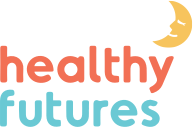Your Baby
Requires a very simple but complete diet of breastmilk or iron-fortified infant formula. The American Academy of Pediatrics recommends that parents wait until as close to 6 months as possible to introduce solids to their baby’s diet.
Holds its head up when on its tummy and may roll from tummy to back – Playtime on the stomach stimulates the brain and strengthens muscles.
Uses her eyes and hands to explore objects and focuses on objects using both eyes – Encourage your baby by placing bright objects placed within reach and having a variety or toys, rattles, board books, and other objects to explore.
Sits up with support – Help the baby sit on your lap. Remember that baby seats such as saucers, jumpers, walkers and seats like the Bumbo disrupt and can delay development.
Laughs and smiles when she sees someone familiar – Try to have a consistent caregiver.
Turns his/her head to locate a sound – Talk and sing to her whenever you can. And Remember: To learn language, your baby needs to both hear sounds and see your face as you talk.
Coos, grins squeals and imitates sounds – Interact and talk about daily routines.
May Cry – Crying is normal but can be difficult for parents. For more information on normal infant crying, visit Period of Purple Crying
Your Family
Manage Your Stress – Caring for a baby can be stressful and frustrating. Sometimes it may be necessary to take a “time” out. Carefully place your baby in a safe place such as their crib and step away from the situation. Take deep breaths. Never shake the baby. This can cause permanent brain damage or death. If you feel like your stress and fatigue are catching up to you, ask for help from friends, family, your spouse, partner or your health care provider.
Keep Your Social Life – Social connections with other parents are very important for everyone in your family. Great Start is a resource to help connect to activities and other families in your area. For information on Great Start in your area, visit their Facebook page.
Your Checklist
1. Check all toys for loose and small parts that could be a choking hazard – Anything less than two inches in diameter.
2. Don’t Leave Your Baby Unattended on a High Surface – Remain nearby and on alert when your baby is on a high surface such as a changing table. Your baby may surprise you by scooting or roll off quickly.
3. Keep up with Vaccines – Your baby is due for his four-month immunizations and well-baby checkup. Call your baby’s health care provider or your local health department to make an appointment.
4. Keep Practicing the Safe Sleep Guidelines
- Put baby on back to sleep
- Keep soft toys, pillows, blankets, and bumper pads out of crib
- Remove crib toys that fit across the crib
5. Make Sure Your Babysitter is Prepared – When you are ready to leave your baby with a babysitter, make sure they are prepared. If this is the babysitter’s first time in your home, take the sitter on a tour of the house, noting all exits, phones, off-limit areas, and flashlights. If you do not have a landline, make sure the sitter has a functional mobile phone. Provide the sitter with the following information:
- Your name, address, and phone number
- The number where you can be reached
- Emergency number, including poison control number: 1-800-222-1222
- What time you will return
- House rules
Questions for Your Health Care Provider
Ask him or her for their recommendations on the introduction of solid foods. The American Academy of Pediatrics recommends that parents wait until as close to 6 months as possible to introduce solids to their baby’s diet. Until this point babies require a very simple but complete diet of breastmilk or iron-fortified infant formula. Rice cereal is usually the first solid attempted followed by other infant cereals; single fruits and vegetables usually follow. It is recommended that only one new food be added at a time so you will know if a food doesn’t agree with your baby. There are many signs that you can watch for to know your baby is ready for solids including being able to sit up and have good head control. Other signs include:
Infants are born with a natural reflex to stick their tongue out if something is in their mouth that they are not ready to eat. When this reflex disappears that may be a sign that your baby is ready for solids.
When your baby opens her mouth when she sees the spoon coming and can keep most of the food in her mouth, she is on her way!
Call your health care provider if you have any concerns about your baby’s hearing. Frequent ear infections can drastically alter the quality of sound your baby can hear.




